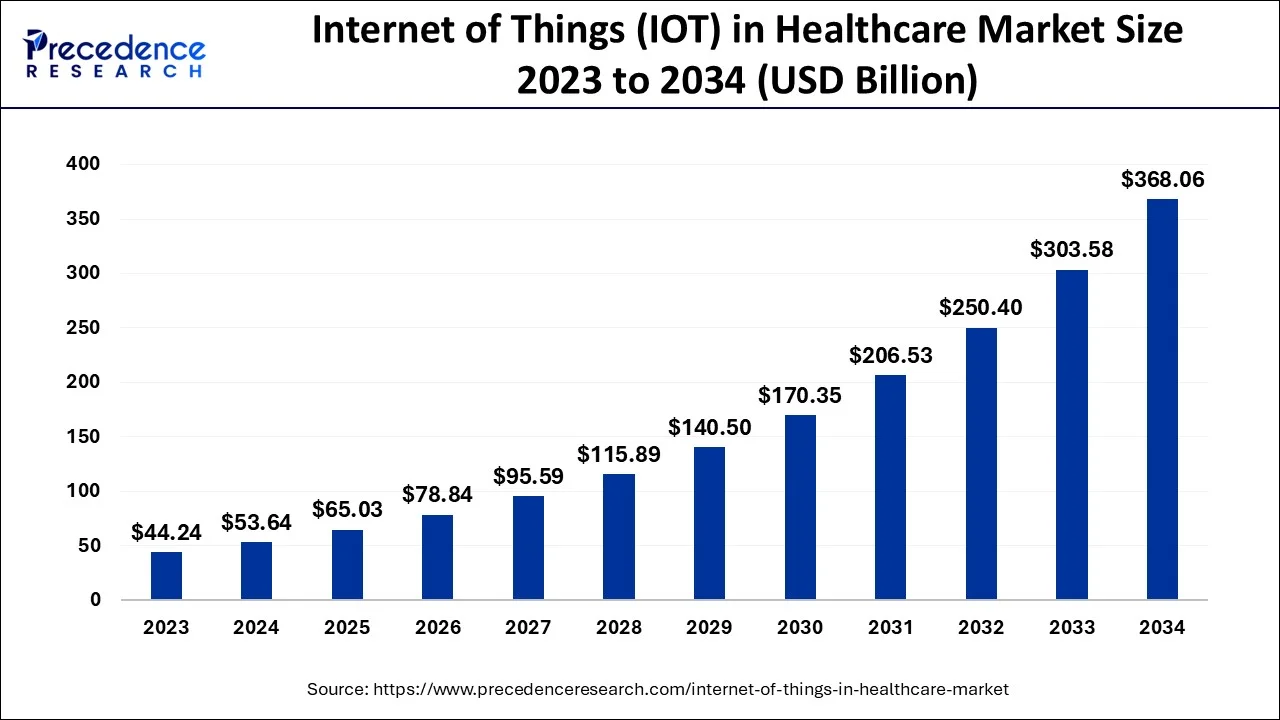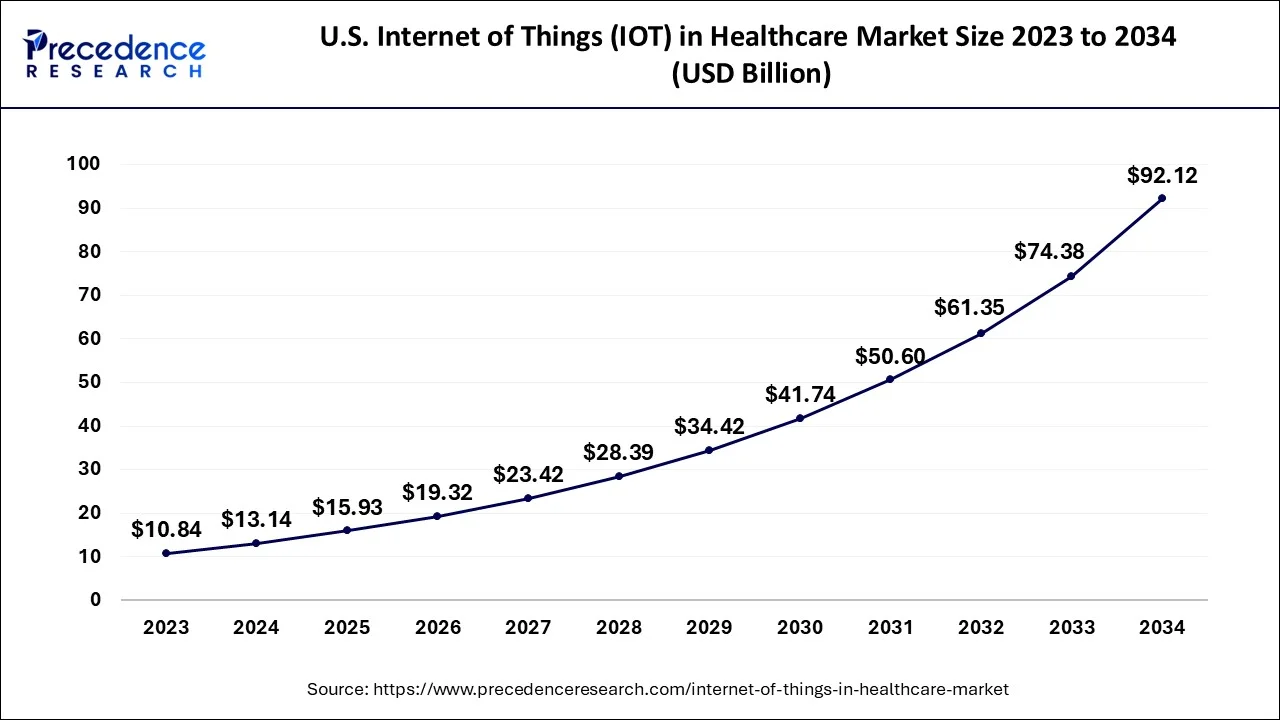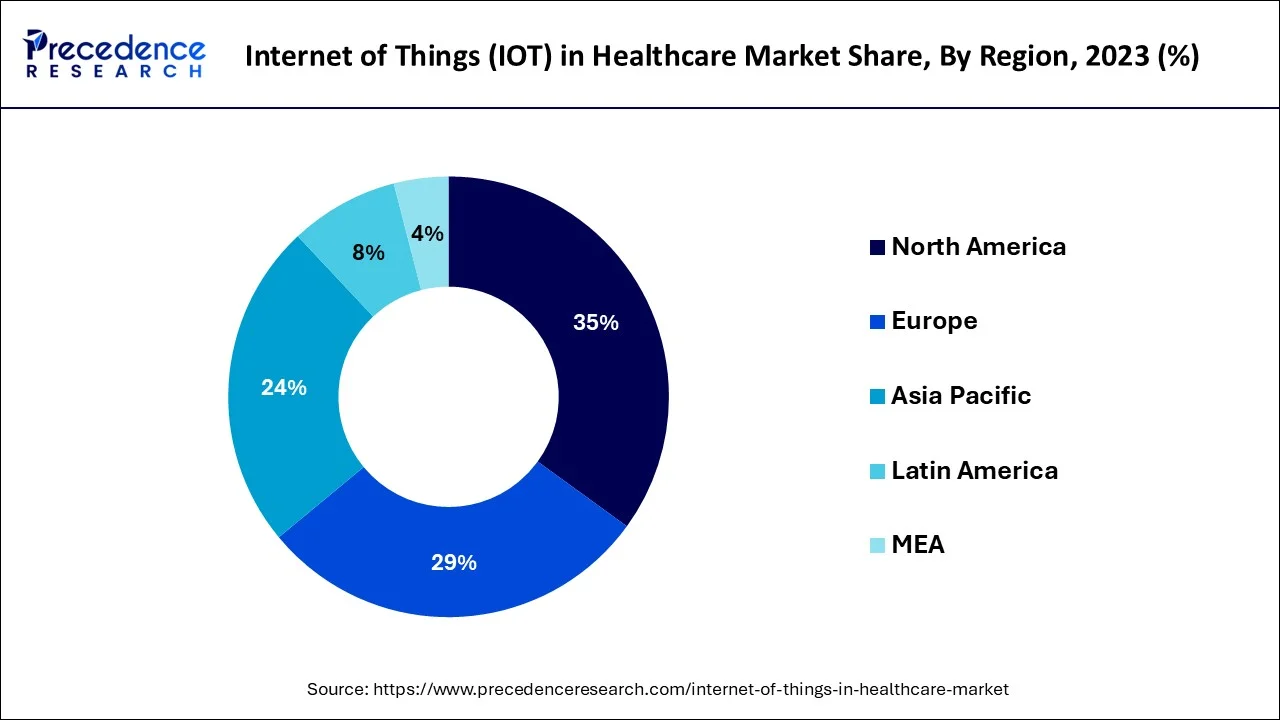What is the Internet of Things (IOT) in Healthcare Market Size?
The global internet of things (IOT) in healthcare market size is valued at USD 65.03 billion in 2025 and is predicted to increase from USD 78.84 billion in 2026 to approximately USD 368.06 billion by 2034, expanding at a CAGR of 21.24% from 2025 to 2034.

Internet of Things (IOT) in Healthcare Market Key Takeaways
- North America has had the highest revenue share of over 35% in 2024.
- Asia Pacific region is projected to grow at a CAGR of 18.50% from 2024 to 2034.
Market Overview
Internet involves the collecting of the data, analyzing the data, monitoring and research process. IoT in healthcare market basically includes sensors, software's, information processing systems and many more. The increase of the IoT in healthcare have shown maximum growth due to increased demands of medical devices in health care center and increasing number of active patients day by day and increased focus on medical devices with high efficiency and good results in a short period of time.
Improved digitalization across the different regions with developing countries with new technologies and innovations produced. Government also integrated and promoted for the development and facilities to increase the medical devices in healthcare market drives the market to grow.
IoT includes sharing of the data from one machine to another machine, smart phones to the machines and on smart watches with developed technologies over wireless connections, embedded system. Advanced software's developed in medical devices advanced sensors and increased research and development of IoT in healthcare increased the market rate during the forecast period.
Internet of Things (IoT) in Healthcare Market Outlook
- Industry Growth Overview: The internet of things (IoT) in healthcare market is poised for explosive growth from 2025 to 2034. This growth is driven by the increasing prevalence of chronic diseases, the demand for remote patient monitoring (RPM) and telehealth, and the significant integration of AI and 5G networks, which are improving hospital efficiency and patient outcomes.
- Global Expansion:The market is expanding globally, with North America currently holding the largest market share due to a robust healthcare IT infrastructure and supportive government policies. Emerging regions such as Asia-Pacific, Latin America, and MEA offer significant opportunities for market expansion due to rising healthcare expenditures, large populations, increased smartphone penetration, and government digital health initiatives.
- Major Investors:Venture Capital (VC) firms, private equity, and strategic investors are actively investing, attracted by the potential for high returns and social impact. Major tech and healthcare players like Microsoft, IBM, GE Healthcare, and Philips are heavily investing in R&D, strategic alliances, and acquisitions to integrate IoT into their core offerings.
- Startup Ecosystem:The startup ecosystem is maturing rapidly, with a focus on innovative solutions in real-time patient monitoring, AI-driven analytics, and IoMT development. Emerging firms are attracting significant VC funding by offering novel solutions like remote diagnostic kits and advanced continuous glucose monitoring devices.
Internet of Things (IOT) in Healthcare Market Growth Factors
The advanced developed technologies of medical devices in IoT with wide utilization of medical devices in healthcare center due to increased number of active patients with chronic disorders which involves respiratory disease, COPD, genetic disorders and many more have helped to boost the market growth rate.
Rapid development of new innovative technology with various facilities integrated by the government is driving the market growth. Government support from various countries for development and availability of medical devices in health care center. Medical devices based on IoT are such a drug affectivity tracker, transferring tools, air quality sensors, remote care biometric scanners, monitoring of blood pressure, determining blood glucose levels, oxygen monitoring, temperature monitor, developed surgical equipment, connected contact lenses, sleep monitors, inhalers, wearable devices. Machine learning and artificial intelligence are integrated in the devices. Availability of the devices with easy usage, effective efficient, increased safety, security, privacy and standard procedures and skills followed by the professionals. Which drives the market growth of IoT in healthcare.
Impact of covid-19 virus have largely affected the market growth of healthcare in IoT. Increased number of infected patients with virus increased number of hospitalizations for a longer period of time with usage of medical devices. More than 185 million peoples are infected by the corona virus and millions of deaths.
Governments from various countries have imposed the rules and regulations to control the wide spread of the disease. Shutdown of the nation, ceased transportation, curfews. Increased number of covid-19 positive patient thrived the number of testing procedures and expansion of IoT in healthcare market growth.
Market Scope
| Report Coverage | Details | |
| Market Size in 2025 | USD 65.03 Billion | |
| Market Size in 2026 | USD 78.84 Billion | |
| Market Size by 2034 | USD 368.06 Billion | |
| Growth Rate from 2025 to 2034 | CAGR of 21.24% | |
| Base Year | 2024 | |
| Forecast Period | 2025 to 2034 | |
| Segments Covered | Medical Devices, Software and System, Services, Product, Connectivity | |
| Regions Covered |
|
Market Dynamics
Key Market Drivers
Driving factors of IoT in healthcare have enhanced the medical devices market growth. Advanced developed technologies of medical devices in health sector for patients safety with efficient and effective procedures. Increase costing of the medical devices in health care sector in last few years because of the advanced technologies developed and increased the quality of the service provided by the health center.
The rising number of the active patients with chronic disorders, respiratory diseases, genetic diseases, COPD and other disorders which increased the hospitalization an increased use of medical devices. Increasing huge number of geriatric patients. The major factor rising of the IoT healthcare is due to outdated old medical and clinical devices with errors in the devices which attracted the attention of the patients towards the newly developed technologies.
Key Market Challenges
Increased usage of the IoT in healthcare in health care center due to increased number of patients and developed technologies in medical devices over wireless connections, embedded systems and other. Transmitting of data from one machine to another machine over wireless connectivity, developed software's and updating of the software's is utmost important for continue chain of the process.
Increased online processed with more data security issues and the data hack or release of the data is the challenging task to challenge the expansion of the growth of the market rate. Increased costing of the medical devices in health sector with developed technologies is the challenging task for the growth. Many citizens cannot afford the cost of the medical devices.
Key market opportunities
Due to increased self-medical devices available in the market for example, glucose monitor, blood pressure monitoring devices, self-injecting, sleep monitor device, stress monitors, inhalers installed in the smart phone or the smart watches over wireless connectivity. Which enhanced the market growth of IoT in healthcare.
Decreased ratio of doctor to patient in various countries. Developed technologies for wireless connectivity between one users to another user. The number of imposed new policies from the government such as reimbursement. Which enables the citizens to experience.
Increased research and development of the medical devices in IoT with improved technologies and facilities with new infrastructures of health care center developed. The key market players involved in introducing the new medical devices contributes to enhance the market growth of IoT.
Product Insights
Segmentation of IoT in healthcare on the basis of product advanced developed technologies with improved electronic health records for monitoring the health. Which includes vital signs monitoring devices involves blood glucose monitors, blood pressure monitors, multipara meter monitors, Heart rate monitors. Imaging systems, respiratory devices, patient monitoring, infusion pump, hearing devices, anesthesia machines, ventilators, neurological devices, fetal monitoring devices, implantable cardiac devices includes pacemakers, implantable cardiac monitors, implantable cardioverter defibrillators and other products. Advanced developed technology of medical devices using wireless connections in health care center has increased widely to monitor the health of the active patient, management of disorders, and many more which boost the market high.
Type Insights
Segmentation of internet of things in healthcare based on the type basically involves stationary medical devices, implantable medical devices, wearable medical devices and other medical devices with enhanced development and features of medical devices in health care center. Based on connectivity technology Wi-Fi, Bluetooth, signee and other embedded systems which carry out the work flow smoothly without any disruption. System and software involved re analytics layer, database layer, network layer.
Application Insights
Segmentation of internet of things healthcare based on the application widely utilized in the telemedicine, store and forward telemedicine over a software using the wireless connections, medication management, interactive medication, monitoring of the patient, clinical operations, work flow management, clinical imaging, measurement of fitness. Drug development and research which helps to boost the IoT healthcare market.
Regional Insights
U.S. Internet of Things (IOT) in Healthcare Market Size and Growth 2025 to 2034
The U.S. internet of things (IOT) in healthcare market size is evaluated at USD 15.93 billion in 2025 and is predicted to be worth around USD 92.12 billion by 2034, rising at a CAGR of 21.50% from 2025 to 2034.

How Does North America Lead the Internet of Things (IoT) in Healthcare Market in 2024?
North America led the market with the largest share in 2024, largely driven by its advanced and established healthcare infrastructure and high adoption rate of digital health technologies. The region is characterized by significant investments in R&D, the presence of major tech and healthcare companies such as GE Healthcare, Medtronic, IBM, and Philips, and a regulatory environment, such as HIPAA in the U.S., that, while stringent, helps ensure data security and promotes market trust. The prevalence of chronic diseases and an aging population is driving the adoption of remote patient monitoring solutions.
U.S. Internet of Things (IOT) in Healthcare Market Trends
The U.S. is the leading force in North America, generating the highest global revenue. It has a well-developed IT infrastructure, high demand for value-based care, and widespread use of electronic health records (EHRs). Favorable government initiatives, like the FDA's Digital Health Innovation Action Plan, speed up the adoption of wearable health devices and telemedicine.

Why Asia-Pacific Considered the Fastest-Growing Region in the Internet of Things (IoT) in Healthcare Market?
Asia-Pacific is expected to experience the fastest growth during the forecast period, mainly because it is poised to become the leading market in terms of share. This rapid expansion is driven by increasing healthcare spending, a large and aging population, and proactive government initiatives focused on modernizing healthcare infrastructure, especially in rural areas. The region presents significant opportunities for affordable, localized solutions, and the rising adoption of 5G networks and AI integration further accelerates market growth.
China Internet of Things (IOT) in Healthcare Market Trends
China leads the market in Asia-Pacific. It has seen rapid development in medical devices supported by government-backed smart healthcare initiatives, such as Healthy China 2030. Its massive population and increasing disposable income fuel demand for advanced, accessible medical technologies, including AI-powered diagnostics and remote patient monitoring systems.
How is the Opportunistic Rise of Europe in the Internet of Things (IoT) in Healthcare Market?
Europe is experiencing a notable growth, driven by stringent data protection regulations such as the General Data Protection Regulation. The market is also driven by an aging population, rising chronic disease incidence, and a strong emphasis on telemedicine and remote patient monitoring to reduce healthcare costs and improve outcomes. The region, including countries such as Germany, the UK, and France, is heavily investing in digital health initiatives and in the integration of AI with IoT.
Germany Internet of Things (IOT) in Healthcare Market Trends
Germany is a key player in the European market, focusing on high-quality healthcare delivery and technological innovation. The market is driven by the need for efficient patient monitoring, hospital automation, and an aging population that requires continuous care management. With major medical device manufacturers and technology companies based locally, R&D in areas like connected imaging, EHR, and advanced data analytics is important for developing advanced, secure, and interoperable IoT solutions.
What Potentiates the Growth of the Latin America Internet of Things (IOT) in Healthcare Market?
The market in Latin America is driven by increasing government efforts to improve healthcare infrastructure, a growing prevalence of chronic diseases, and a push for affordable treatment and remote care solutions. The region is experiencing greater adoption of remote patient monitoring, telemedicine, and wearable devices, which became especially important during the COVID-19 pandemic to reduce hospital visits. The market benefits from ongoing improvements in network infrastructure and rising smartphone penetration, making data exchange and healthcare access easier.
Brazil Internet of Things (IOT) in Healthcare Market Trends
Brazil holds a significant share of the market, driven by technological progress, a growing emphasis on patient-centered care, and government initiatives. The use of connected devices in hospitals and clinics is rising to enhance operational efficiency and patient care. Key applications include telemedicine, patient monitoring, and workflow management, with major companies like Philips, GE Healthcare, and IBM competing in the market.
What Factors Drive the Growth of the Market in the Middle East and Africa?
The internet of things (IoT) in healthcare market in the Middle East and Africa is experiencing steady growth, driven by increasing investments in healthcare infrastructure, high demand for telehealth solutions, and government initiatives focusing on digital transformation. The market is projected to reach significant revenues, with the UAE and Saudi Arabia as key players due to their national visions that promote digital health. The focus is on improving operational efficiency in hospitals, enhancing patient engagement through connected devices, and facilitating remote monitoring.
Saudi Arabia Internet of Things (IOT) in Healthcare Market Trends
Saudi Arabia plays a unique role in the global market, driven by bold government initiatives aimed at transforming the country into a digital powerhouse and diversifying its economy. The nation is heavily investing in smart city projects and digital health to improve healthcare services and patient outcomes. Key factors include the increasing prevalence of chronic diseases, the need for remote patient monitoring, and advancements in 5G and data analytics, which enhance accessibility and efficiency for standardized IoT protocols across facilities.
Value Chain Analysis
- Device Manufacturing and Hardware Production
This stage involves creating physical components like sensors, wearables, and medical devices.
Key Players: Medtronic, Abbott Laboratories, Intel, Qualcomm. - Connectivity and Network Infrastructure
This stage focuses on transmitting data from devices via various networks (cellular, Wi-Fi, LPWAN).
Key Players: Verizon, AT&T, Cisco, Sierra Wireless. - Platform Development and Data Aggregation
This stage involves aggregating, processing, and storing data on cloud platforms, ensuring interoperability.
Key Players: AWS, Microsoft Azure, Google Cloud, IBM Watson Health, Epic Systems. - Service Delivery and Application Integration
Integrates IoT applications into clinical workflows, such as remote patient monitoring and telehealth.
Key Players: Teladoc Health, Amwell, Mayo Clinic. - Support, Security, and Compliance
This stage ensures cybersecurity, data privacy (HIPAA), and regulatory adherence for the entire system.
Key Players: Cisco, Palo Alto Networks, HHS, and FDA.
Top Companies in the Internet of Things (IOT) in Healthcare Market
- Medtronic: Offers IoT-enabled medical implants, smart insulin pumps, and remote patient monitoring for chronic disease management, with revenue $32.36 billion in 2024.
- Koninklijke Philips N.V.: Provides connected care solutions, wearable health monitors, and AI-enabled platforms for remote monitoring and diagnostics, with revenue $19.37 billion in 2024.
- GE Healthcare: Focuses on smart diagnostic imaging (MRI/CT), patient monitoring systems, and AI-enabled platforms for clinical workflow optimization with $19.67 billion.
- Abbott Laboratories:Known for continuous glucose monitoring (FreeStyle Libre) and other connected diagnostic and cardiac devices for real-time patient monitoring, with revenue $42 billion.
- Siemens AG:Specializes in IoT-powered diagnostic imaging, laboratory diagnostics, and smart hospital platforms with AI integration.
Other Key Players
- Hillrom- Welch Allyn
- Stanley Healthcare
- AgaMtrix
- iHealth Lab, Inc
- AliveCor, Inc
- Bio Telemetry, Inc
- Omron Healthcare, Inc
- Johnson & Johnson Services, Inc
- Boston Scientific Corporation
- BIOTRNIK
- Honeywell Life Care Solutions
Recent Developments
- In February 2024, KORE and Medical Guardian announced a collaboration to create a medical alert device using eSIM technology, enabling seamless network switching for optimal connectivity. The MGMini device promotes active aging and enhances safety for seniors.
(Source: prnewswire.com) - In September 2024, Meta Platforms unveiled new Ray-Ban Display glasses with high-resolution in-lens displays and intuitive gesture control via a Neural Band wrist device. These glasses will be available globally in 2026, positioning Meta as a leader in display technology.
(Source: scanx.trade)
Segments covered in the report
By Medical Devices
- Stationary Medical Devices
- Wearable External Medical Devices
- Implantable Medical Device
- Other medical devices
By Software and System
- Application Security
- Network Security
- Data Analytics
- Remote Device Management
- Network Bandwidth Management
By Services
- Architecture (System Integration)
- Consulting
- Application Development (Support and Maintenance)
By Product
- Vital Signs Monitoring Devices
- Blood Glucose Monitors
- ECGs/Heart Rate Monitors
- Blood Pressure Monitors
- Multiparameter Monitors
- Oximeters
- Imaging Systems
- Respiratory Devices
- Implantable Cardiac Devices
- Implantable Cardioverter-defibrillators
- Pacemakers
- Implantable Cardiac Monitors
- Patient Monitors
- Infusion Pump
- Fetal Monitoring Devices
- Neurological Devices
- Ventilators
- Anesthesia Machines
- Hearing Devices
- Other Products
By Connectivity
- Bluetooth
- Zigbee
- Wi-Fi
- NFC
- Embedded System
- Others
By End User
- Hospitals
- Clinics
- Laboratory Research
- Others
By Geography
- North America
- U.S.
- Canada
- Europe
- U.K.
- Germany
- France
- Asia-Pacific
- China
- India
- Japan
- South Korea
- Malaysia
- Philippines
- Latin America
- Brazil
- Rest of Latin America
- Middle East & Africa (MEA)
 Get a Sample
Get a Sample
 Table Of Content
Table Of Content



